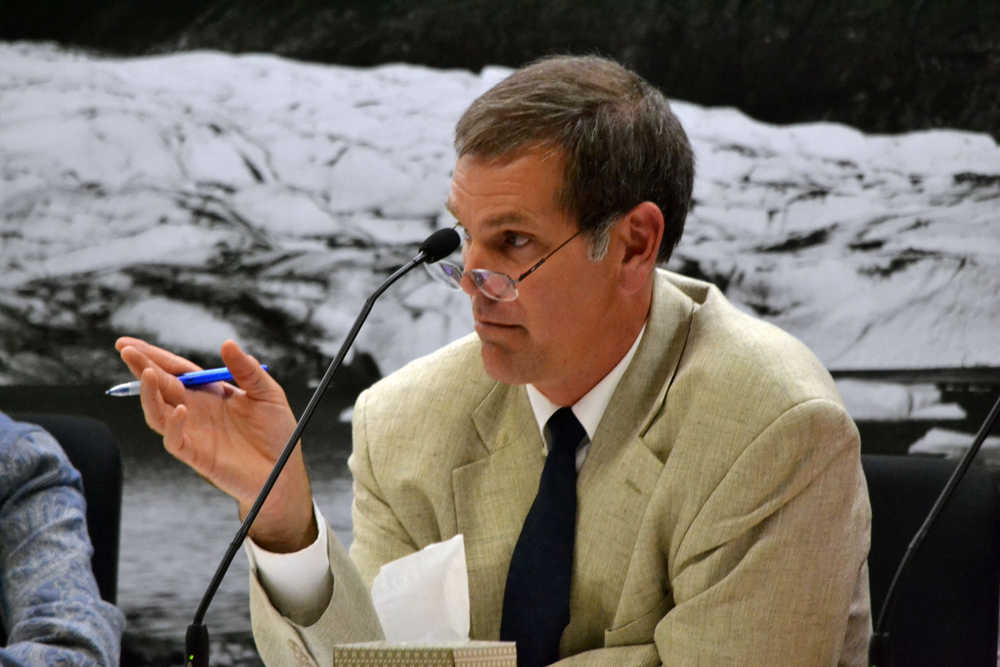The Juneau Assembly Finance Committee met Thursday night to figure out how the city will fill the nearly $4.8 million hole Gov. Bill Walker poked in its fiscal year 2017 budget in late June.
“I think the message is basically: congratulations, you finished the budget. Now let’s start the budget,” City Manager Rorie Watt told committee members wryly.
In late May, the Assembly passed a balanced budget for the coming (now current, as of July 1) fiscal year. A month later — and days before that budget became effective — Walker used his veto pen to cut the state’s budget by about $1.3 billion, effectively leaving Juneau on the hook for an additional $4.8 million.
One veto in particular makes up for most of Juneau’s newfound deficit. The governor cut about $31 million from school debt reimbursement, leaving the city on the bad end of a bargain with the state. This veto alone left the city with a hole of more than $3 million in its FY 2017 budget.
[With vetoes, Walker slashes into city budget]
“I believe the state has made a commitment for the school debt reimbursement,” City Finance Director Bob Bartholomew told the Assembly Finance Committee. “We kind of still expect that commitment to be met, but I’m also a realist, and I don’t know that the probability of that is very high.”
Walker’s decision to halve the Permanent Fund Dividend, now expected to be about $1,000, will also impact the city. Bartholomew projects that Juneau’s sales tax revenue will fall by about $1 million this year as a result.
[Gov. Walker limits oil checks to $1,000]
A $4.8 million budget deficit is nothing to blink at, but Watt and Bartholomew both advised the Finance Committee not to do anything rash in order to rebalance the city budget.
“We just went through a couple years of downsizing, and our plan was to have one year of adjusting,” Bartholmew said, reminding the committee that 2017 was supposed to be the city’s adjustment period. “I still think that plan makes sense.”
Watt recommended that the committee avoid laying off city employees, freezing hiring and eliminating vacancies, all of which he said would weaken the city. Instead, he and Bartholomew advised the Finance Committee to find $500,000 in savings and reductions, pull $3.1 million from the city’s budget reserve and use about $700,000 initially allocated to fund deferred maintenance projects.
This plan would draw the city’s rainy-day fund from about $12.3 million down to about $9.2 million.
“That’s still a fund balance that gives us the flexibility that we think we need,” Bartholomew said.
The Finance Committee didn’t ultimately make any budgetary decisions Thursday night, which Bartholomew said wasn’t necessary, but he strongly recommended that the committee be prepared to make some hard decisions at its meeting next month.
The committee decided it needed a little more time to come up with solutions to the close the city’s budget gap, most members made very clear that they don’t plan to pass the proverbial buck.
“I think it’s important that we shore up our own financial house,” committee member Kate Troll said, explaining that the city’s current financial problems were born of legislative inaction.
Though the city’s budget hole was directly caused by the governor’s vetoes, Finance Committee members and city staff more frequently blamed the Alaska Legislature for their financial woes.
Walker’s vetoes were a double-dog-dare-you move to get the Alaska Legislature to reduce the state’s $3.2 billion budget deficit, He figured his heavy cuts to the Permanent Fund Dividend and school debt reimbursement would galvanize the Legislature, prompting the House and Senate to take deficit-reducing measures. Only then would he maybe rescind the vetoes.
Walker’s plan didn’t work. Both chambers of the Legislature gaveled out days after the last special session started. They took no action to reduce the state’s budget deficit, allowing the governor’s vetoes to stand and leaving Juneau and other communities up the creek.
[Senate rejects call for veto override; Legislature poised to adjourn with no action]
The Finance Committee will meet on Sept. 7 to continue discussing how it will rebalance its FY 2017 budget. Committee Chair Jerry Nankervis asked each member to come up ideas before then and vet them with city staff. All of the committee members agreed to do as much.
“We’re all headed in generally the same direction, cautiously but speedily,” committee member Jesse Kiehl said.
• Contact reporter Sam DeGrave at 523-2279 or sam.degrave@juneauempire.com.
Read more news:
Infographic: A visual guide to the money behind Tuesday’s primary election
Going green one audit at a time
Down in the dumps: Airport closes lavatory dumpsite after surprise FDA inspection

